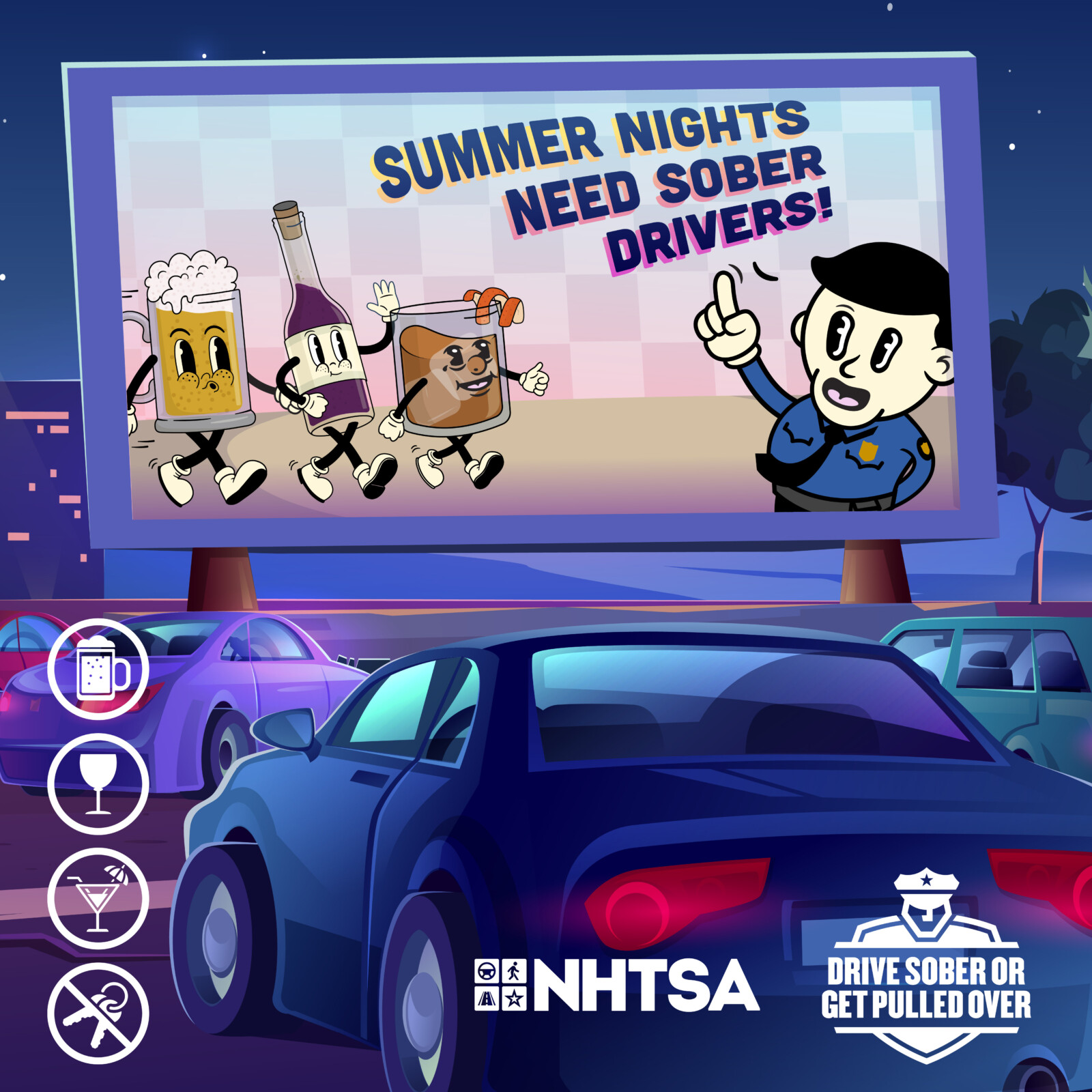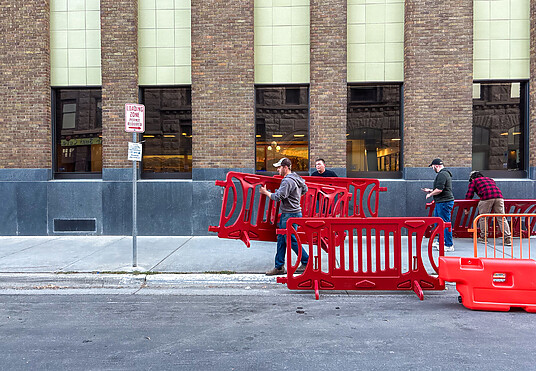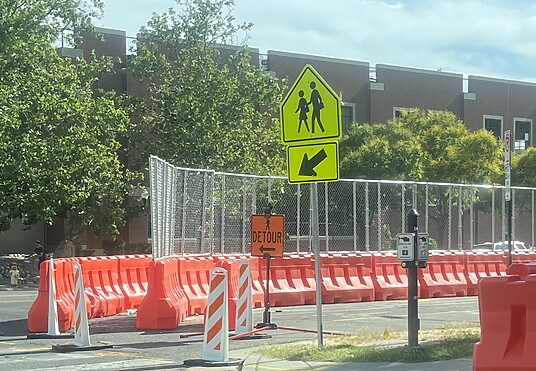Drive Sober or Get Pulled Over: August Safety Campaign

Drinking and driving is out, getting home safely is in.
In the United States, approximately one person dies every 39 minutes in a drunk-driving crash. That’s 37 people every day, or over 13,000 people a year (2022, NHTSA). This is a deadly reality that offenders can face steep consequences for.
Combatting drunk driving with tough enforcement has been par for the course since the 1980s. The NHTSA and police forces across the nation work towards decreasing accidents and fatalities caused by drunk driving with continued strict enforcement, bringing awareness, and campaigns like “Drive Sober or Get Pulled Over”.
What is the Drive Sober or Get Pulled Over Campaign?
Drive Sober or Get Pulled Over is “a national high-visibility enforcement campaign that focuses on the consequences of drunk driving and is supported by increased law enforcement” (Traffic Safety Marketing, NHTSA). Running from August 14 through September 2, 2024, for media and awareness and highly enforced from August 16 through September 2, 2024, the campaign seeks to decrease impaired driving as a whole and make our roads safer for all.
Why is a campaign like this so important?
Driving under the influence doesn’t just put you at risk – operating a vehicle while alcohol is in your system puts every single person you pass in jeopardy, whether on the road or the sidewalk. While many people think they’ll be fine on the road after a drink or two, it’s important to remember that alcohol affects your body and brain in several ways:
- Vision is often impaired
- Reactions are slowed
- Coordination is uncertain at best
- Multitasking is nearly impossible (not that it should be done while driving regardless)
These reasons (and more) drastically affect the way someone handles a vehicle and all highlight why driving sober is so important… and how dangerous driving drunk can be.
All hands on deck
Because this is a nationwide campaign, all state police forces work together in a heightened effort to enforce the laws concerning driving while intoxicated. Most state police sites have a page (like this) dedicated to the number of traffic stops resulting in arrests made during the campaign. The New Hampshire Police Department made 473 stops during the last active campaign, and, of those stops, 14 arrests were made for driving while intoxicated and 16 arrests for various other offenses. While the percentage may seem small (2.96%), every arrest made of a drunken individual decreases the chance that a fatal accident may occur.
A weekend of fun can turn deadly because of drunk driving.
This “Drive Sober or Get Pulled Over” campaign is running from mid-August to the beginning of September with the hope of increasing awareness around the dangers of drunk driving before Labor Day Weekend.
For insight into why this timing is important, take a look at the numbers:
In 2022, the Labor Day holiday weekend showed 490 crash fatalities nationwide. These crashes took place from 6 PM on September 2 to 5:59 AM on September 6, and, of these crash fatalities, 190 (39%) involved a drunk driver. Not only that but nearly 25% involved drivers who were operating vehicles with a BAC of almost twice the legal limit (.15+ BAC) (Labor Day Stats, NHTSA).
These individuals might have been “enjoying” their holiday, but their holiday (and potentially their lives) was cut short by the poor decision to drive while intoxicated. Not only is the drunk driver at risk of becoming a statistic but there are individuals and families affected by the aftermath of drunk driving crash fatalities as well.
Enjoy your holiday responsibly
A long weekend off is always a welcome respite, but enjoying a holiday surprisingly comes with responsibilities, especially when alcohol is involved.
Plan ahead and follow these simple tips to enjoy your holiday responsibly:
-
- Empty stomach? Eat some food first. Alcohol will hit your bloodstream harder and faster when you haven’t eaten anything, and trying to make up for it later won’t help “soak it up”. Eat ahead of time so that the effects of alcohol are slowed.
- Designate that (sober) driver. If you’re planning on going anywhere after the cabin or the campsite, determine who won’t be drinking and ensure that they can get you all to your next destination safely. Don’t assume someone will be able to just because they’re drinking less; agree in advance who will stay sober and be in charge of driving home.
- Leave the car. A surefire way to ensure you can’t drink and drive is to make your car inaccessible. If you’re out on the town, rely on public transportation or walking, or, if you’re out at the lake, staying home to party, or at a campsite, hiding your keys well could also be an effective way to keep you grounded. If all else fails and you’re at a friend or family member’s home, stay the night so that you don’t drive while intoxicated.
- Wait it out. Your level of intoxication is going to depend on a myriad of factors, so, when you’re out of options, just give it time. Everybody responds differently to alcohol, and the number of drinks, the rate at which they were drunk, the person’s build, and how strong the beverages were will all contribute. Waiting it out and allowing the alcohol to leave your bloodstream is truly the only way to “sober up”.
Planning ahead in order to avoid driving drunk is going to be the number one way you keep the roads near you safe this Labor Day weekend (and always).
OTW supports roadway safety in all its forms
OTW Safety works tirelessly to advocate for safety in every form, and we are a staunch supporter of roadway safety. This support extends to campaigns like “Drive Sober or Get Pulled Over”, as those driving in a drunken state pose a risk to not only themselves but other drivers, work zone workers, passengers, and pedestrians.
Stay safe this holiday (and every holiday) and enjoy your time responsibly – because if you don’t stay sober, you’ll get pulled over.
https://www.nhtsa.gov/risky-driving/drunk-driving


